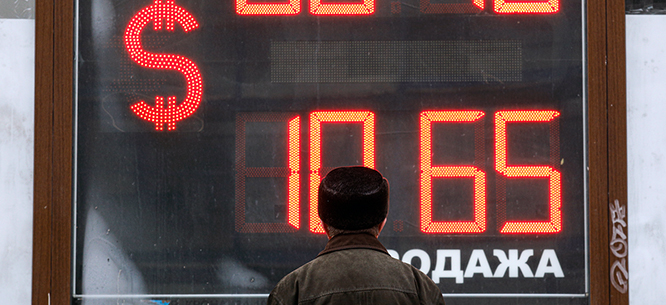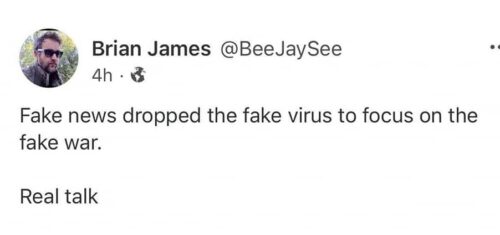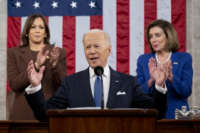As the Russian invasion of Ukraine enters its second week, we turn now to look at how the Biden administration is responding to the crisis. Biden has repeatedly condemned Russia’s invasion and opposed unprecedented sanctions on Russia in what some have described as a form of “economic warfare.” While President Biden has ruled out sending troops into Ukraine, the U.S. is directly aiding Ukraine militarily. CNN is reporting the U.S. has recently delivered hundreds of Stinger anti-aircraft missiles to Ukraine for the first time. President Biden took questions outside the White House Wednesday.
REPORTER 1: Do you support permanent U.S. military presence in Poland and other Eastern European countries now, after what’s happening in Ukraine?
PRESIDENT JOE BIDEN: We’ve always been there. We’ve always been in all the NATO countries.
REPORTER 1: I’m talking about permanent bases.
PRESIDENT JOE BIDEN: No, that’s a decision for NATO to make.
REPORTER 2: Do you think that —
REPORTER 3: Mr. President, what did you mean when you said —
REPORTER 4: Will you consider getting rid of vaccine mandates?
PRESIDENT JOE BIDEN: I’m sorry.
REPORTER 5: Mr. President, are you considering banning Russian oil imports?
PRESIDENT JOE BIDEN: Nothing is off the table.
AMY GOODMAN: We’re joined now by Matt Duss, foreign policy adviser for Senator Bernie Sanders. He’s also a Ukrainian American. His father was born in Germany in a displaced persons camp after World War II after his family fled Ukraine.
Matt Duss, welcome to Democracy Now! Can respond, first of all, just to the overall situation, then particularly to the U.S. response and what needs to be done?
MATT DUSS: Well, I mean, I think your previous guests described the horrifying situation in Ukraine right now, which is just — we’ve just passed over a week of this Russian invasion. We’re seeing more shelling of Ukrainian cities. And this is from — you know, Putin justified this invasion claiming that he was there to liberate Russians and Ukrainians from a fascist government. We don’t need to tick through all the various justifications he has given, but I think Ukrainians, obviously, knew that was false, but I think Russian soldiers themselves now should be questioning whether that’s false.
As for the U.S. response, I think we’ve seen, you know, even in the months and certainly the weeks leading up to the invasion, a very energetic diplomatic response from the United States to work with allies in Europe, NATO allies, but not only NATO allies, with allies in Asia, to prepare a sanctions response. I think that sanctions response has been extremely aggressive. It’s become not just sanctions on Putin and his government and oligarchs around Putin, but over the week we saw serious sanctions cutting off a number of banks from the SWIFT system, as your previous guest mentioned, but also effectively blocking sanctions on the central bank of Russia. So, these are very, very serious measures, and I think we’ll have to watch now how Putin decides to respond.
NERMEEN SHAIKH: Well, Matt, as you know, many have called for more — many in Ukraine have called for, minimally, more punitive sanctions, including an embargo on oil and gas exports. Europe is, of course, dependent for most of its gas and oil — 40 and 30%, respectively — from Russia. And Russia’s revenues, of course, also come from the sale of these oil and gas reserves. Could you talk about whether you think that’s likely, and, even if these sanctions are imposed, whether that is likely to deter Russia?
MATT DUSS: Right. No, I think there are two things here. One, that is it likely? And I want to say it’s very possible, although that is something that is going to hit European countries much, much harder, and, frankly, it’s going to hit the United States much harder. And, you know, it’s going to raise the price of gas. It’s going to raise the price of goods. That’s certainly not an argument against it. I mean, I think if we are serious about imposing costs on the Russian government and on Vladimir Putin, that is, as President Biden said in the press remarks that you just played, everything is on the table. I think it also gets at the importance, ultimately — and this is something my boss, Senator Sanders, has talked about — to use this moment to shift more aggressively to green energy and deny these authoritarian regimes, not just Putin but a broader set of petrostates, the revenues they require to rule.
But getting to the second point: How does this impact Putin’s calculation, the Russian government’s calculation? That is a real — you know, that’s a question I have, as well. I think Putin has, unfortunately, laid out a number of very, very expansive goals and has not really left himself — I mean, it’s hard to see how he would climb down from the very expansive agenda he’s laid out. Many of your listeners are probably aware of the speech that he gave last week on the eve of the invasion, where he kind of laid out his theory that Ukraine is not a real country and this is part of the kind of Russian imperium, as he defines it. You know, and he would not be the first leader to walk back from some very wild — you know, this kind of wild agenda. But as of right now, it’s unclear to me how he might do that.
And we should also be very mindful of the impact that these sanctions are going to make, not just on the regime but on Russian working people themselves. This is, I think, a broader concern that progressives have about these kinds of sanctions tools, because if the theory of the case is that you will put pressure on the people who will, in turn, put pressure on their rulers, it’s not quite clear how exactly that works when you’re dealing with governments that are simply not responsive to the will of their people, as is the case in Russia.
AMY GOODMAN: Matt, I wanted to ask you about former Secretary of State Hillary Clinton’s comments on MSNBC Monday, talking about Russia’s invasion of Ukraine.
HILLARY CLINTON: Remember, the Russians invaded Afghanistan back in 1980. And although no country went in, they certainly had a lot of countries supplying arms and advice and even some advisers to those who were recruited to fight Russia. It didn’t end well for the Russians. There were other unintended consequences, as we know. But the fact is that a very motivated and then funded and armed insurgency basically drove the Russians out of Afghanistan. … I think that is the model that people are now looking toward.
AMY GOODMAN: “Unintended consequences,” Matt Duss?
MATT DUSS: Yeah.
AMY GOODMAN: Again, that’s the former Secretary of State Hillary Clinton.
MATT DUSS: Yeah, I would just respond to that by saying it didn’t end well for the Russians; it really didn’t end well for anyone, least of all the people of Afghanistan themselves. So, I certainly understand this may — you know, this invasion may backfire, ultimately, on Putin and on the Russian government, but I think we should not see this in terms simply of using the Ukrainians as a tool of our foreign policy and our conflict with Russia. I think the goal needs to be to end this fighting as quickly as we possibly can, to use every diplomatic lever we can to end this fighting. I think that should be our focus.
AMY GOODMAN: I wanted to quickly ask you about oligarchs. You referred to the Russian oligarchs. But you talk about the oligarchs on both sides.
MATT DUSS: Mm-hmm, yeah, that’s right. I mean, what is an oligarch? It’s a very wealthy and politically influential person, just in its broadest definition. Certainly, there is a set of oligarchs that have a lot of influence in Russia. And let’s understand, one of the reasons why these oligarchs do have such power and wealth and influence is in large part because of the kind of neoliberal shock therapy that was applied to Russia in the wake of the collapse of the Soviet Union, backed often by U.S. economists, who effectively auctioned off — who urged Russia to auction off the people’s property, and it was gathered up by these oligarchs for their own wealth. And Putin — you know, this led to such an economic collapse and economic hardship that this, in turn, enabled the rise of a strongman like Putin, who gathered the oligarchs under his own control.
And this is certainly not the first time the United States has run this scam. Let’s understand, this kind of shock therapy has been applied in a number of countries around the world and has produced similar authoritarian outcomes. Now, having said that, I think we also have — you know, in our political system, while it is certainly not the same as Russia’s, to say the least, we have a problem here of large concentrations of wealth and the political influence that that can buy in our system.
NERMEEN SHAIKH: Matt, I’d like to conclude by asking you about what you imagine the trajectory of this conflict might be. I mean, what Hillary Clinton said about unintended consequences and, of course, also about the defeat of the Russians in Afghanistan by — the Soviets at the time in Afghanistan is wrong. There are people who are expecting that this may turn out the same way, because even though the Americans and the Europeans have ruled out a no-fly zone, they are flooding Ukraine with weapons. And Russia, Putin doesn’t show any indication of backing down, because, as you pointed out, it’s not clear how he would save face or, indeed, how at this point the Russians can extract themselves. What do you think a resolution would look like? And do you think it’s likely?
MATT DUSS: Yeah, well, hopefully — I mean, the goal here, whether one agrees with it or not, I would say that the Biden administration’s approach here has been fairly consistent for some time, which is to make clear to Putin that this invasion will be much more costly than he might have imagined. And I certainly think that Putin is seeing that right now, both in terms of the strength and the breadth of the sanctions that have been applied on Russia, with the U.S. working with its allies around the world, but also in terms of the Ukrainian resistance. I think some of the casualties that you read out earlier, these are pretty remarkable. I think there are some estimates that put the number of Russian troops killed at around 7,000. We should be cautious about those numbers right now. But let’s just understand, 7,000 would be as many troops as the U.S. lost in Afghanistan and Iraq, almost combined, in nearly 20 years.
So, in terms — so, the logic here is, you know, understanding that the Ukrainians themselves are resisting the Russian invasion. I think they have a right to do so, certainly. I think the goal should continue to be, or our focus should continue to be: What are the steps that end this fighting quickest, that continue to support diplomacy? Yes, the Ukrainians are agreeing to meet once again with the Russians, as you noted, on the Belarus border to find some diplomatic resolution here that ends the fighting. But, to be very honest, as I said earlier, given the aims that Putin has laid out, it’s unclear to me if he is ready to take that offramp. So, for the time being, unfortunately — and it’s enormously painful to say this — but it’s hard for me to see how this stops anytime soon.
AMY GOODMAN: Matt Duss, we want to thank you so much for being with us, foreign policy adviser to Senator Bernie Sanders. Matt Duss is a Ukrainian American.
Coming up, could Russia’s war in Ukraine spark a nuclear catastrophe? Russia’s Foreign Minister Sergey Lavrov has warned if a Third World War is to take place, it’ll be nuclear. Stay with us.
[break]
AMY GOODMAN: “Gonna Be an Engineer” by Peggy Seeger. It is Women’s History Month.
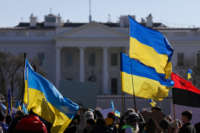

 (@OxfordDiplomat)
(@OxfordDiplomat) 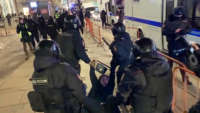
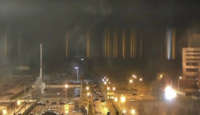


 (@HoydenSpark)
(@HoydenSpark) 